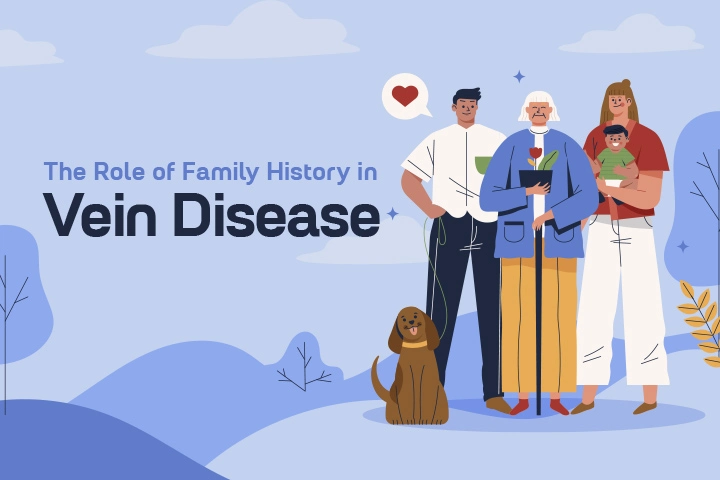Recent Blogs
- 11 Common Risk Factors for Venous Insufficiency
- What Are The Differences of Superficial and Deep Veins?
- Varicose Veins and Athletes: Can Sports Cause or Prevent Them?
- Choosing the Right Varicose Vein Doctor
- The Benefits of Minimally Invasive Vein Treatments: What You Need to Know
- Bulging Veins (Varicose Veins)- A part of Pregnancy
- Effective Vena-Seal Procedure for Varicose Veins
- 8 ways to motivate yourself to walk
- Top 10 Varicose Vein Myths-Busted!
- Do Varicose Veins Get Worse Without Treatment?
Published on: 08-Jul-2024

Vein diseases have become a chronic challenge, affecting millions of people worldwide. The disease traces its roots to multiple factors, such as obesity, prolonged standing, age, gender, and genetic mutation. Genetic mutations have been identified as one of the major causes of venous diseases. However, this aspect lacks attention due to limited awareness of genetic factors influencing venous diseases.
This blog post will illuminate the genetic influence on vein disease and their accompanying risk factors.
Let’s begin:
An Overview of Vein Diseases
Vein diseases occur when veins have trouble sending blood from the limb back to the heart, leading to blood pooling in the legs. There are different types of vein diseases that must be analyzed for effective diagnosis, treatment, and prevention. Some of the most common types include spider veins, varicose veins, chronic venous insufficiency, deep vein thrombosis, and venous ulcers. Varicose veins are the most common vein disease.
Varicose vein is a condition in which veins are swollen, twisted, and visible under the skin's surface, most prominently in the legs. Due to the failure of the valve, blood pools in the veins and enlarges it. Noticeable symptoms include aching pain, swelling, and crampy legs.
Varicose veins can be caused by genetic, physiological, or lifestyle factors. Genetics is considered the most common cause. Irrespective of the cause, effective varicose vein treatment is possible if you seek advice from specialized and skilled healthcare professionals.
Influence of Genetics in Developing Varicose Veins
Research has consistently shown an enduring relationship between genetics and its impact on overall health. Take a glance at the report, which shows that the risk of vein diseases escalates to a staggering 90% if both parents have varicose veins syndrome. Considering these factors, let’s understand the genetic role in chronic vein diseases.
1- Alteration in The Extracellular Matrix
Numerous genetic mechanisms have been involved in the development of varicose veins. The first involves changes in the extracellular matrix that provide structural support to blood vessels. Due to this genetic variation, the integrity of the extracellular matrix is affected, which weakens vein walls and makes them more predisposed to valve dysfunction.
2- Mutation of Smooth Muscle
Smooth muscle cells are crucial for regulating the contraction and relaxation of blood vessels. When genetic mutations alter the matrix of these cells, it can lead to the development of varicose veins by disrupting the function and the normal dynamics of venous circulation.
3- Inherited Connective Tissue Disorder
Certain inherited connective tissue disorders like Marfan syndrome can substantially affect vein health. This condition is identified by abnormalities in the body’s connective tissues, which provide elasticity in blood vessels. People with this genetic disorder may have veins susceptible to stretching, causing the development of varicose veins and other venous insufficiencies.
4- Blood Clotting Disorder
Blood clotting disorder further leads to the development of varicose veins. Due to inherited blood clotting disorder, blood clots can obstruct veins, which increases venous pressure. It damages vein walls and valves, predisposing them to varicose veins.
Implications of Vein Diseases
The implications of vein diseases include:
Leg pain
Swelling and crampy leg
Sensation of heaviness or fatigue
Chronic pain
Ulcer
Blood clots
Besides physical discomfort, vein diseases have been a significant reason for psychological distress due to the chronic nature of the condition. However, these conditions can be effectively managed with advanced treatment and proper medical supervision.
Get Vein Disease Treatment
Early diagnosis can effectively prevent the progression of vein disease. Seeking advice from medical professionals is the cornerstone to controlling the further progression of the disease. Comprehensive Vein Care Clinic, a well-renowned medical clinic, offers advanced treatment procedures for vein insufficiencies. We offer top-notch medical treatments for vein diseases. Our medical staff is dedicated to delivering exceptional care and innovative vein treatments, ensuring the speedy recovery of patients.
For more information, visit our website or book an appointment.